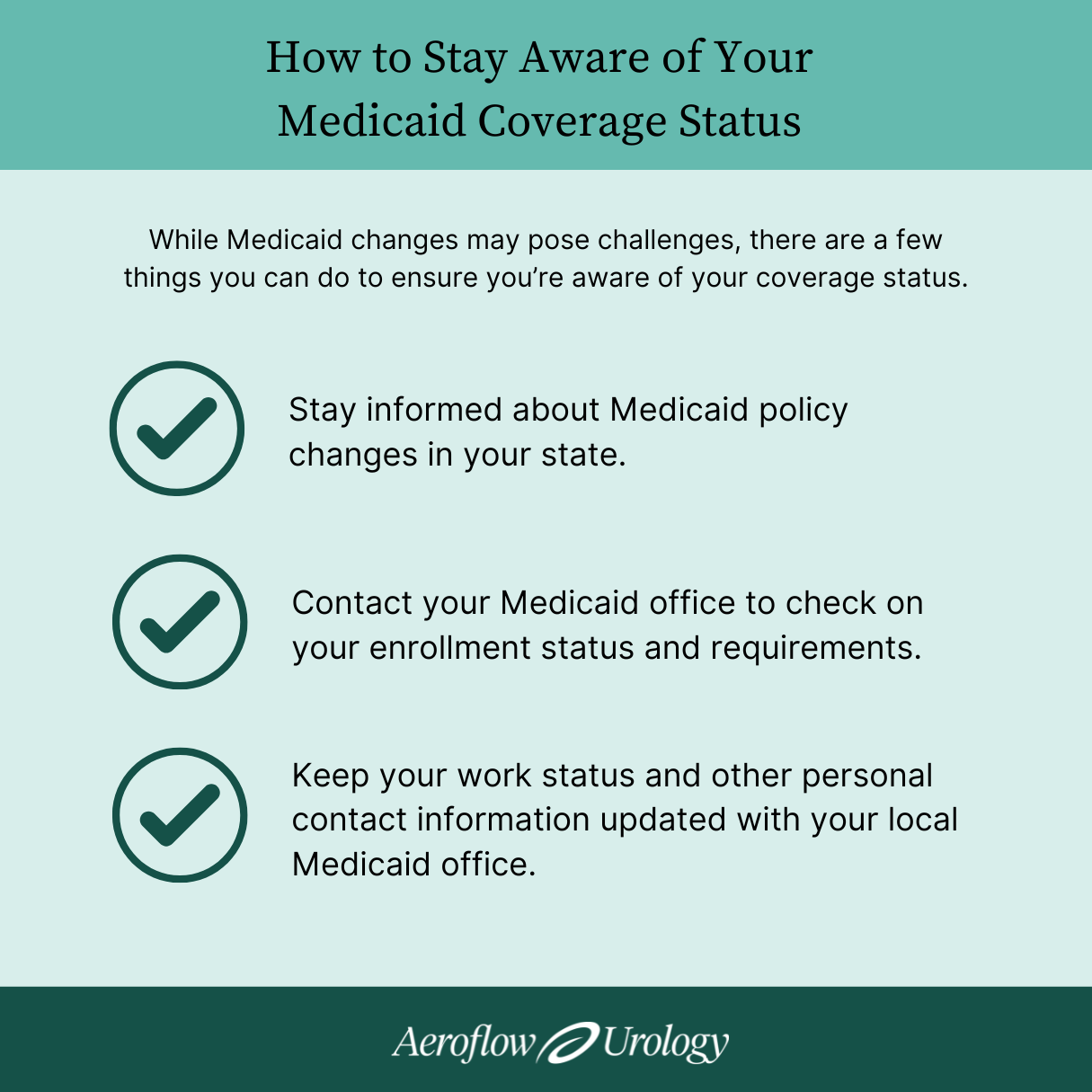Key Takeaways:
-
New policies in some states may require Medicaid beneficiaries to prove employment or participation in approved activities, which could create barriers for low-income workers, caregivers, and individuals with disabilities.
-
Reduced Medicaid funding could force states to limit coverage for critical healthcare services, impacting those who rely on incontinence supplies for their health and well-being.
-
Checking your Medicaid status, understanding state policy changes, and updating your work and contact information can help ensure continued access to care.
Medicaid provides essential healthcare coverage to millions, but proposed work requirements and budget cuts could impact access for many beneficiaries.
While work requirements aim to encourage employment, they may create barriers for those with disabilities, caregivers, and low-income workers. Budget cuts could also force states to reduce coverage for critical services like incontinence supplies.
Understanding these changes can help you stay informed and protect your access to care.
What Are Medicaid Work Requirements?
Medicaid work requirements are rules made by the federal government and state policymakers that Medicaid enrollees must meet to keep their coverage. Work requirements (community engagement) are defined by activities, like going to work, school, job training, or volunteering.
Traditionally, individuals qualify for Medicaid programs based on their annual household income, often a helpful determinator for those on low income, but work requirements for adults are new eligibility rules that ensure people are working while receiving benefits.
As of January 2025, only Arkansas and Georgia have implemented work requirements for Medicaid beneficiaries in the states.
Under Arkansas’ Pathway to Prosperity program from 2018 to 2019, Medicaid enrollees ages 19 to 49 were required to complete 80 hours of work or community engagement every month. If beneficiaries didn’t report their work hours, they lost insurance coverage, leaving them uninsured.
While Georgia’s Pathways to Coverage program expanded Medicaid coverage for certain individuals in the state who have an annual income up to 100% of the federal poverty level (FPL), it requires that beneficiaries abide by a work requirement policy that does not give exceptions to individuals who have disabilities or care for children at home.
Proposed Medicaid Work Requirements
Since the start of the year, a handful of states have introduced legislation for Medicaid work requirements. These include:
- Ohio
- South Carolina.
- South Dakota.
- North Carolina.
- New Hampshire.
- Connecticut
- New York.
- Iowa
- Idaho
- Indiana
- Kentucky
If approved in these states, new Medicaid work requirements could mean that certain beneficiaries must prove they are working, looking for work, or participating in approved activities to keep their healthcare coverage.
While these requirements can encourage employment and proper Medicaid budget spending, they can create challenges for many individuals currently receiving Medicaid, including those who already work, those who cannot physically work (people with disabilities or certain medical conditions), and caregivers of older family members or young children.
When Arkansas implemented Medicaid work requirements in 2018, over 180,000 beneficiaries lost their coverage. It was also shown that reporting requirements confused enrollees and cost states more money to put into place.
The Center on Budget and Policy Priorities estimates that new work requirements would cause 36 million people across different states to lose their Medicaid coverage.
Check your coverage for 100% free incontinence products now!
Check your coverage for 100% free incontinence products now!
Proposed Medicaid Budget Cuts
Recent reports indicate that Congress is considering significant reductions to the Medicaid program, potentially impacting millions of Americans.
These proposed cuts—including the elimination of Affordable Care Act (ACA) expansion funding, per capita spending caps, and adding work requirements—could have serious consequences, particularly for those who rely on Medicaid for essential medical supplies, such as incontinence products.
Eliminating federal Medicaid expansion funding could result in up to 20 million people losing coverage. Low-income families, individuals with disabilities and certain medical conditions, and those of all ages with incontinence may face loss of Medicaid coverage, leading to potentially detrimental outcomes. Beneficiaries losing Medicaid could also lead to higher healthcare costs in the long run due to delayed treatment.


What Do These Changes Mean for Medicaid Beneficiaries?
New Medicaid budget cuts and work requirements could mean different things for different groups of beneficiaries.
Able-Bodied Adults
- Adults who can work may struggle with meeting work requirements. Inconsistent employment, caregiving responsibilities, and certain health conditions that don’t qualify for exemption may pose challenges for this group.
- Some adults may find reporting work hours confusing and may not be able to successfully prove their eligibility for coverage.
People With Disabilities or Medical Conditions
- Some people may not meet certain disability criteria despite having medical needs.
- Those with changing or chronic health conditions may struggle with maintaining stable employment.
Caregivers & Low-Wage Workers
- Many Medicaid recipients work in low-wage jobs with unpredictable schedules, meaning they may not meet their required work hours.
- Unpaid caregivers (especially those caring for older or younger family members with disabilities or medical conditions) may not qualify for work exemptions.
Medicaid Changes & Incontinence Supply Coverage
For many adults and children, Medicaid services provide essential access to incontinence supplies, such as adult briefs, diapers, and pull-ons, to maintain their health and well-being. These products are necessary for preserving dignity, hygiene, and overall health. Unfortunately, for those receiving free incontinence supplies through their insurance plans, cuts to Medicaid and new work requirements could lead to:
- Loss of access: Individuals may lose coverage for these essential supplies, forcing them to choose between necessities and their health.
- Increased financial burden: Families and individuals will be forced to pay for the products out-of-pocket, which is often difficult or even impossible for those on limited incomes.
- Deteriorating health: Lack of access to proper incontinence management can lead to skin infections, urinary tract infections, and other serious health complications.
- Social isolation: The inability to manage incontinence can lead to social isolation and a decline in quality of life.
What You Can Do
While Medicaid changes may pose challenges, there are a few things you can do to ensure you’re aware of your coverage status.
- Stay informed about Medicaid policy changes in your state.
- Contact your Medicaid office to check on your enrollment status and requirements.
- Keep your work status and other personal contact information updated with your local Medicaid office.
While Medicaid changes may create challenges, staying proactive can help you maintain your coverage. By keeping up with policy updates in your state, regularly checking your enrollment status, and ensuring your work and contact information are up to date with your local Medicaid office, you can better navigate any changes and protect your access to essential healthcare services.
References:
Coleman, A., & Federman, S. (2025). Work Requirements for Medicaid Enrollees. Commonwealthfund.org. https://doi.org/10.26099/r361-mv95
Minemyer, P. (2025, February 27). Major Medicaid cuts are looming. Here’s a look at the impacts they may have. Fierce Healthcare. https://www.fiercehealthcare.com/regulatory/major-medicaid-cuts-are-looming-heres-look-impacts-they-may-have
What is a Medicaid work requirement? (2023, January 30). Healthinsurance.org. https://www.healthinsurance.org/glossary/medicaid-work-requirement/
5 Key Facts About Medicaid Work Requirements | KFF. (2025, February 24). KFF. https://www.kff.org/medicaid/issue-brief/5-key-facts-about-medicaid-work-requirements/
Lukens, G. (2025, January 16). Medicaid Work Requirements Could Put 36 Million People at Risk of Losing Health Coverage | Center on Budget and Policy Priorities. Center on Budget and Policy Priorities. https://www.cbpp.org/research/health/medicaid-work-requirements-could-put-36-million-people-at-risk-of-losing-health
Disclaimer
Information provided on the Aeroflow Urology blog is not intended as a substitute for medical advice or care from a healthcare professional. Aeroflow recommends consulting your healthcare provider if you are experiencing medical issues relating to incontinence.













